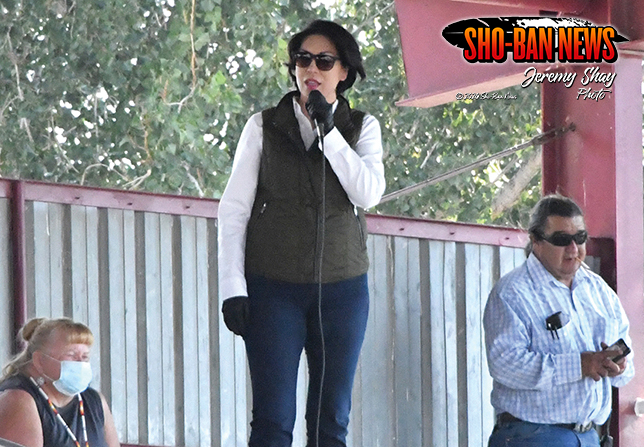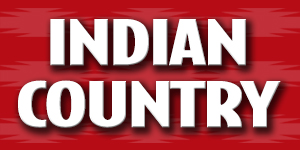Paulette Jordan makes campaign stop in Fort Hall

Jordan met with elders on Monday, August 10.
By ROSELYNN YAZZIE
Sho-Ban News
FORT HALL — Native American democratic candidate for U.S. Senate Paulette Jordan made a campaign stop in Fort Hall this weekend.
On Saturday, August 8 she did the welcome at the Indian Relay Races. She was impressed with the Tribes social distance measures at the races and commended the Shoshone-Bannock Tribes for taking action and protecting their people.
On Sunday she met with Fort Hall Business Council Acting Chairman Kevin Callahan where they discussed tribal issues and concerns with the COVID-19 pandemic and CARES Act funding.
Callahan said he was thankful to sit down with Jordan and Travis Oler, candidate for the Idaho House of Representatives for Bingham County, Legislative District 31, Seat B.
“It is always a great thing to have representatives coming to the Fort Hall Reservation to talk about what we need and answer their questions on what they can help us with on their campaign trails,” he said, adding it was important for people to get out and vote.
Jordan hopes the states and the tribes can work hand in hand to push the U.S. Senate to come up with another package of relief funding to provide a sense of relief for people now that they’re seeing the end of the first package and some people are unemployed, facing eviction and food banks are overwhelmed. She said they not only have to check on elders, but also the young people.
They discussed voter suppression issues and want to make sure people are not disenfranchised and have access to voting.

Paulette Jordan welcomed the Indian Relay audience on Saturday, August 8.
On Monday, August 10 she had a press conference with local media to give a campaign update.
She called Fort Hall “home” as it was a place she grew up during childhood. The Racehorse family helped raise her.
Her primary focus was on encouraging voter turnout, participating in the U.S. Census, and staying safe during the COVID-19 pandemic.
In regards to voting, she talked about the importance of getting the young people involved. They do this by inviting them to the table and ensuring they have the access and the resources they need, and educating them to participate in the voting process.
“If we are not educating our young people to participate, then they are allowing others to speak for them,” she said. “This is the most important election in this nation’s history and of course we want everyone to be able to participate.”
She talked about her discussion with the FHBC Acting Chairman and the concerns on the U.S. Census and the low participation rates on tribal lands and rural communities. She reminds everyone they need everyone to participate in it. The Fort Hall Indian Reservation has a low participation rate of 20 percent. She said the Coeur d’Alene Tribe has roughly around 37 percent, Nez Perce Tribe around 40 percent, Shoshone-Paiute Tribe has around nine percent.
“So we have to do better,” she said. She encouraged everyone to do their surveys to make sure funding comes back into the communities, especially to be used for roadwork, schools, and healthcare programs.
Campaigning during the pandemic has been different, but they’re being innovative and optimizing through virtual activity. They’ve sent out messages through social media, going through email and phone banking. They’re also talking about drive through theaters and hosting events there. Her main effort is to check on the communities and show support. They also want to check out the local health clinics and talk about health care. She said they take the matter very seriously and are cautious with their volunteers and staff. They are proceeding in a way to be respectful to every town and community in the state. They plan to host more virtual townhalls and tele-townhalls, where seniors can get on the phone. They want to be as accessible as possible.
Jordan said as an Indigenous woman and as Indigenous people they are not tied to any party system.
“Idaho deserves a leader that is not tied to party rhetoric,” she added she didn't want to bring anyone down, but to be positive and uplift communities in the best way they can.
“In this time, in the financial and health care crisis that we face our country deserves Indigenous leadership like mine,” she said.
During her visit she met with elders from their vehicles as they picked up their lunch from the Elder Nutrition Program. She presented them with a scarf and a sign for their yard.





